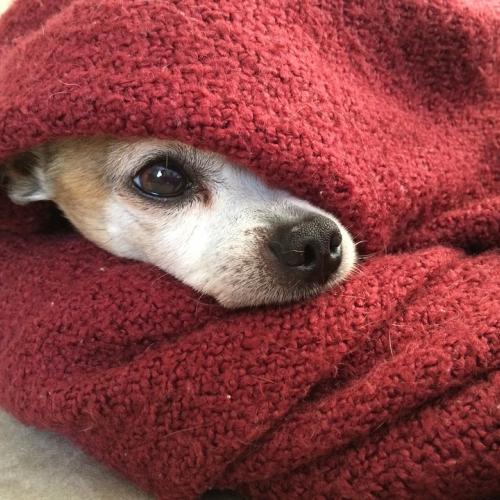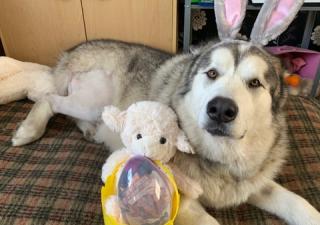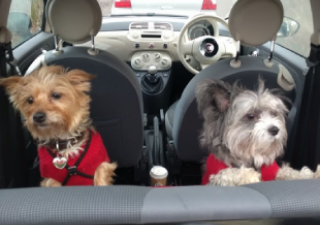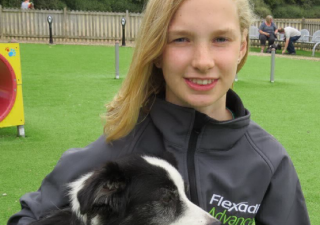
Why are dogs scared of fireworks?
Back to overviewFear of fireworks is one of the most commonly reported problem behaviours in dogs, and is thought to affect about half of all pet dogs to some degree. So why are dogs afraid of fireworks?
Fear is the body’s way of keeping us safe. It triggers unpleasant sensations that drive us to move away from things that may harm us. Although fireworks can be sensed in many ways, dogs tend to use sound as one of their key ways of identifying possible threats and so it is the noise they make that most dogs find distressing.
Firework noises are very short, can happen at any time and, to the dog, have no obvious cause. This makes it hard for them to identify where the noises are coming from and so to work out whether they are safe. Dogs that are scared of fireworks are also often afraid of other sudden loud noises such as gunshot, thunder or cars backfiring, as these are equally unpredictable and hard to identify the source of.
Why are some dogs more likely to be scared of fireworks than others?
Not all dogs are scared of fireworks. If a puppy hears fireworks when he or she is very young they will usually learn there is nothing to be afraid of. This process is called habituation and works best when a puppy is between 3-13 weeks old (see blog “Can I prevent my dog being afraid of fireworks?”). However, dogs that did not experience fireworks or other loud banging noises as a puppy may not have had the opportunity to learn they are harmless and so are more likely to react fearfully when they are older. Some dogs are more prone to this than others: -
· Dogs that are generally anxious or find it hard to cope with new things are much more likely to develop a sensitivity to this type of noise
· Breeds that are particularly sensitive to sound, such as the Border collie, are more likely to pay attention and so become fearful of noises
· Dogs that have had a genuinely unpleasant experience linked to fireworks or similar noises are particularly likely to become fearful. For example, if a dog is taken out after dark around the firework season and hears a sudden very loud firework it is very likely to make him or her much more sensitive to this type of noise in the future.
Why do some dogs seem to become more scared of fireworks over time?
Habituation is the process by which dogs get used to something and stop paying attention to it once they realise it is harmless. This process is most effective in very young puppies, but older dogs are also able to habituate to new things. For example, when a dog moves to a new house he or she may be restless and unsure at first but will usually settle in after a while i.e. will ‘habituate’ to the new environment. So an older dog can learn fireworks are nothing to worry about too.
However, where a dog is already fearful of something this can prevent habituation. This is because, even though distant fireworks won’t harm them, the unpleasant feelings associated with the fear they trigger will maintain or even intensify the dog’s belief that they are genuinely harmful and need to be avoided. This is why it is important to get help as soon as possible if your dog is showing fear of noises.
Fear of fireworks can also spread to or from other similar sounds, such as thunder or gunshot, or to things linked to them. For example, if a dog is scared by a very loud firework on a walk he or she may not only be fearful of similar noises in the future, but also of going back to the place they heard it. Some dogs may even become fearful of going out of the house at all after dark or as soon as they sense autumn night’s drawing in, as they know that means the fireworks will soon start.
The level of a dog’s fear can also be intensified if they are unable to find a way to cope with it. For example, if a dog is allowed to hide or stay close to his or her owner during a firework event this will help reduce how scared they feel and so how scared they will feel next time. We all feel much better in scary situations if we know how to prevent anything bad happening to us. However, if the dog feels unable to cope this can intensify their fear making it worse next time. Examples of things that prevent a dog coping include being trapped somewhere, such as in a locked crate, being ignored by their owner who they look to for reassurance or certain medications that sedate the dog without reducing anxiety.
Stephanie Hedges BSc (Hons) CCAB
Canine Behaviour Counsellor
Full member of the Association of Pet Behaviour Counsellors
ASAB Certified Clinical Animal Behaviourist (CCAB)
Animal Behaviour & Training Council (ABTC) Registered Clinical Animal Behaviourist
Tips & Tricks
- Easter is a wonderful time of year with so many chocolate Easter eggs in abundance, but make sure you do not let your pet near them.
- With Brexit deal still in negotiation and a possibility of a ‘no deal’ scenario, there are no concrete answers just yet – but to help you become more informed, here is our Q&A on what we can find so far.
- Build-up of wax and debris in your pet's ear canals can lead to discomfort and irritation. Cleaning your pet’s ears can have a lot of benefits and here are some tips to get you started!
- We had a great time catching up with Mariann Bayliss, our sponsored agility handler last week. We met her competing dog, Ila, and her 5 month old puppy Coral.





